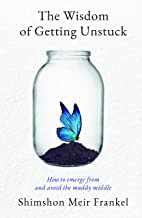By Michael R. Mantell, Ph.D.

 SAN DIEGO — Just what we need, right? Another self-help book?
SAN DIEGO — Just what we need, right? Another self-help book?
But wait, there’s something quite different about this one.
Written by Rabbi Shimshon Meir Frankel, a clinical psychologist living in Zichron Yaakov, Israel, who also practices as a marriage and family therapist, with more than 25 years of experience, his book stands out with its Torah-driven, short-term, solution-oriented focus anchored in ancient wisdom. It puts the reader in the driver’s seat with very concentrated tools to live free of foreign, unhelpful thoughts, “antagonists,” and unhealthy behaviors – it is soul focused and value grounded.
For students of mussar, chassidus and machshavah (ethics, teachings of the Hasidic movement, and thoughts), this is a superb modern-day read. Rabbi Moshe Chaim Luzzatto’s Mesilas Yesharim comes through every page. Rabbi Frankel’s book is indeed a unique self-help book. In reading this book, I’m reminded of Mesilas Yesharim’s aim to connect the reader to his/her deepest responsibilities in life.
The Wisdom of Getting Unstuck is structured to help the reader similarly regain control of life by connecting deeply with his/her soul. As Rabbi Luzzatto writes in his epic work in the name of the sage Pinchas ben Yair, “Rabbi Pinchas ben Yair said: Torah leads to watchfulness; watchfulness leads to alacrity; alacrity leads to cleanliness; cleanliness leads to abstention; abstention leads to purity; purity leads to piety; piety leads to humility; humility leads to fear of sin; fear of sin leads to holiness; holiness leads to prophecy; prophecy leads to the resurrection of the dead.” And this current book leads to that with present-day tools and guiding principles to transform people’s lives to live better, “emerged from and avoiding the muddy middle.”
Some of the author’s “takeaways,” found at the end of each very readable chapter, include:
–“When our lenses are caked with shmutz, it messes with the perception we have of ourselves and the world around us.
-Nobody does anything wrong unless a crazy thought enters his/her mind.
–In murky waters, we compensate by reaching for unhealthy externals. Trying to possess that which is outside of our own domain means we’re unhappy with our lot.
–We’re always on the go, moving either forward or backward.
–The more shmutz that gets in our way, the more numerous our blind spots grow over time, and the more distorted our view. What’s negative looks positive and what looks negative is positive.
–When Hashem wakes us up in the morning and wipes the soot from our eyes, our field of perception is no longer encumbered with the shmutz, and we are thus granted a fresh start and a new perspective.”
One takeaway in this practical manual for people interested in regaining control of their lives that forms the base of much current psychotherapy and mental coaching from a cognitive behavioral perspective, is “When our thinking is corrupt, our only recourse is to get our legs moving – change our place, change our perspective.”
One very appealing use of traditional Jewish source texts the author uses is based on Pirke Avos 5:20, Saying of the Fathers: “Yehudah Ben Teima says: Be strong as a leopard, light as an eagle, swift as a deer, and mighty as a lion to do the will of your Father in Heaven.”
The author then goes about showing the reader how seeing things from the bird’s-eye view, the eagle, allows us to avoid the negative. He draws on the lion by showing us how the heart is home to inspiration and the heart of the lion is the metaphor for that. The legs of the deer are used to demonstrate the benefit of takin action to do good and to invite good into our lives and into the lives of others. And the leopard is brought to help us be strong, hold a positive self-regard, be unintimidated and wear blinders and be “unabashed in the face of negative outside forces.”
From the introduction to the appendix with its detailed outline of each of the 24 chapters for review and reference, this book is a gift of leading a more empowered, peaceful life, a book I highly recommend to move closer to living the life you desire to live.
*
Michael R. Mantell, Ph.D., prepares a weekly D’var Torah for Young Israel of San Diego, where he and his family are members. They are also active members of Congregation Adat Yeshurun. He may be contacted via michael.mantell@sdjewishworld.com